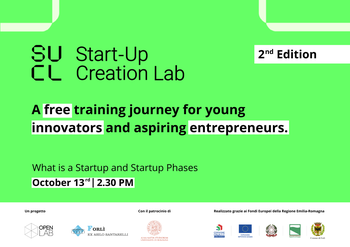Workshop on the Key Elements of an entrepreneurial project
Students and former students of Bologna University
Larn how to define an entrepreneurial project
13 October2025, from 2.30PM to 4.00PM

This training session explores the key elements of an entrepreneurial project, essential knowledge to start to imagine and shape a project in a coherent and sustainable way.
It will also cover the defining features of a startup (innovation, scalability, risk), along with the main stages of its lifecycle: ideation, validation, product/service development, growth, and consolidation.
The training, which will be held in English, is not only for those who already know they want to create a startup, but also for anyone interested in entrepreneurship and innovation who wants to learn more about these topics.
By attending this workshop, you will gain the basic knowledge needed to start outlining an entrepreneurial project and apply for the CALL FOR STARTUP & CALL FOR IDEAS 2025/2026, the University of Bologna’s annual call that selects the best entrepreneurial projects from students and alumni. The next edition will be published in early December.
You can attend either online or in person in Forlì, at Via Caterina Sforza no. 45. We invite you register here.
The session will be led by Dr. Cipriano Moneta, entrepreneur and startup advisor, and is part of the Start-Up Creation Lab, organized by Laboratorio Aperto Forlì under the patronage of the University of Bologna.
FIRST PART (14.30/16.00)
This part of the workshop is designed by Laboratorio Aperto Forlì in collaboration with the University of Bologna and focuses on the key elements of an entrepreneurial project, which are essential for completing the application form for the CALL FOR STARTUP & CALL FOR IDEAS.
Building a startup
1.Introduction
2.The long path
For those who want to, it is also possible to attend also the SECOND PART (4:00–5:30 PM)
Introduction to Lean Canvas: why use it
Example Amazon